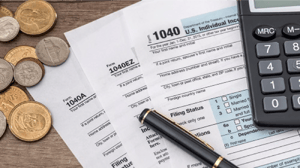What Happens to Your Unpaid Loans When You Die?
You work hard because you want to set your family up for the future they deserve. Unfortunately, there may come a time where you’re not there to...
Manage your everyday finances with convenient accounts, flexible cards, and personalized service designed to fit your life.
At First Federal Bank, we offer flexible mortgage solutions for almost any situation, helping you secure the right financing for your dream home.
Business banking offers secure financial management, streamlined transactions, credit options, and tools to help businesses grow efficiently and sustainably.

 A letter from the Internal Revenue Service states you are being audited. Not news you were expecting, so it’s understandable to feel a little unsettled, panicked or scared. Don’t let you emotions take over. An IRS audit isn’t fun, for sure, but you can handle it. The following tips will help you prepare for an audit:
A letter from the Internal Revenue Service states you are being audited. Not news you were expecting, so it’s understandable to feel a little unsettled, panicked or scared. Don’t let you emotions take over. An IRS audit isn’t fun, for sure, but you can handle it. The following tips will help you prepare for an audit:
Understand the scope
There are different types of IRS audits — correspondence, office, and field audits. In the letter from the IRS, you’ll discover what type of audit you’re facing. A correspondence audit lets you satisfy the audit via mail. Perhaps you owe money to the government or you need to submit further documentation.
“In some correspondence audits where the amounts are small, the IRS simply sends you a letter stating how much additional tax you owe, usually a few hundred dollars or less,” according to The Balance writer William Perez.
If you’re called in for an office edit, you’ll need to report to a local IRS office. You should bring your records with you.
“You can bring a CPA or other tax professional for representation, which may be a good idea to make sure your actions won’t expand the IRS’s inquiries beyond those specified in the audit letter,” according to Investopedia writer Barbara Weltman.
The final type of audit is a field audit, where an IRS agent comes to you.
“While such audits for individuals are very rare, if you are selected for this type of audit it’s advisable that you are not alone; have a tax pro (like an attorney) by your side,” advises Weltman.
Be sure to read the IRS letter completely, as it will not only tell you what type of audit you need to prep for, but it will also lay out your responsibilities and how you should respond to the agent, adds Perez.
Review your return
Now is the time to get out the tax return under review and the documents you used to file it. Kiplinger writers Kevin McCormally and Rocky Mengle recommend auditing yourself. Use your records to find out what’s missing or the errors that caught the attention of the IRS. If you are missing documents, they suggest reconstructing the information you need by obtaining copies of canceled checks, receipt duplicates and statements in writing that support your tax return. “If you can’t come up with written evidence for certain entries, prepare an oral explanation,” they report. It’s in your best interest to be as thorough with your supporting documentation as possible, they add.
Assemble your records
You’ll need hard copies of the tax return in question as well as hard copies of the four years of tax returns that surround it, according to Perez. Receipts for deductions and expenses and your W2 form or 1099 should also be in your paperwork, he adds.
Seek professional help
If you’re finding it difficult to make sense of the IRS letter or are not sure how to get ready for the audit, you can enlist the help of a tax professional. A CPA, tax lawyer or enrolled agent can help guide you through the process or represent your interests during the audit, according to Perez.
With these tips and thorough preparation, you will be as ready as possible for your IRS audit.

You work hard because you want to set your family up for the future they deserve. Unfortunately, there may come a time where you’re not there to...

2 min read
The investment landscape can be volatile and difficult to understand. But investing is a phenomenal way to add to your financial portfolio. The one...

Financial fraud is an unfortunate part of life in the modern age, but there are ways to combat it even if someone manages to purchase something with...
Manage your accounts, make payments, and more.
Open an account with us.